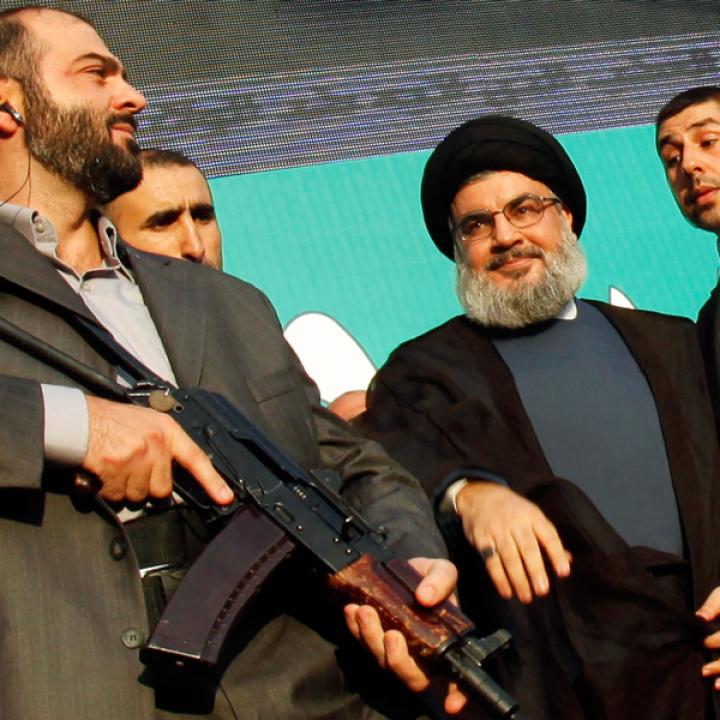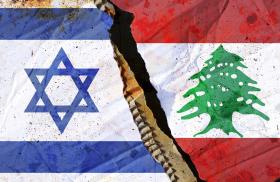
- Policy Analysis
- PolicyWatch 3195
Hezbollah Prioritizes Its Own Interests, Putting Lebanon at Risk

As demonstrators rail against economic problems, corruption, and sectarianism, the group’s role in undermining the public’s financial and physical security is coming under greater scrutiny.
Lebanese citizens took to the streets this weekend to protest the country’s acute financial crisis, which has been marked by one of the highest debt ratios in the world, a new currency crisis, and fears that a strike will close gas stations indefinitely. Many believe that deep-rooted corruption and sectarianism got them into this mess, and may now complicate efforts to get them out.
Against this backdrop, more criticism is being directed at Hezbollah, the widely designated terrorist organization that is simultaneously the most powerful party in Lebanon’s government and an aggressively sectarian movement that keeps its activities and weapons outside the government’s control. As the Treasury Department recently noted, developments over the past few weeks have underscored the extent to which the group’s actions “prioritize its interests, and those of its chief sponsor, Iran, over the welfare of Lebanese citizens and Lebanon’s economy.”
ASSASSINATING LEBANESE POLITICIANS
On September 16, the UN Special Tribunal for Lebanon released details on a new indictment charging Salim Ayyash with helping Hezbollah carry out assassination plots against Lebanese politicians in 2004-2005. The tribunal tied these plots to its core investigation into the February 2005 murder of former prime minister Rafiq Hariri.
Specifically, the new indictment charges Hezbollah operatives with the October 2004 attempted murder of parliamentarian and Hariri ally Marwan Hamadeh, and the killing of his bodyguard, Ghazi Abou Karroum; the July 2005 murder of Khaled Moura, who worked as a driver for the attack’s primary target, Defense Minister Elias Murr; and the October 2005 murder of former Lebanese Communist Party chief George Hawi. For his role in the plots, Ayyash has been charged with homicide and committing terrorist acts. According to the tribunal, “at all times relevant to the indictment, [Ayyash] was a supporter of Hezbollah,” a relationship that included direct ties with the late operational commander Mustafa Badreddine.
PUTTING CIVILIANS AT RISK FOR ITS MISSILE PROJECT
On August 29, Israel revealed that Iranian operatives were working to give Hezbollah the equipment and know-how necessary for building its own precision missiles and retrofitting old missiles in Lebanese facilities. The revelations were no surprise given the September 2018 exposure of three such underground facilities, which the group had constructed in urban neighborhoods of Beirut unbeknownst to the Lebanese government or the local population it put at risk.
The August announcement came just days after Israel reportedly deployed drones to Beirut to destroy missile-related equipment that Iran had sent there. The message was clear: the Israel Defense Forces will not allow a terrorist group to use a neighboring country as a safe haven for developing game-changing weapons, and if the Lebanese state does not deal with the problem, the IDF will.
The strikes occurred against a backdrop of renewed Hezbollah threats. In a July interview, group leader Hassan Nasrallah emphasized the vulnerability of Israel’s population centers and critical infrastructure. Displaying maps showing the range of Hezbollah rockets, he told the group’s al-Manar television network that they “can target this entire region,” pointing to the southern city of Eilat and its environs. “We shall see who will turn the other into the Stone Age,” he concluded. The outrageous nature of such rhetoric becomes clear when one recalls what Nasrallah represents: a militia leader with no position in the Lebanese government, elected or otherwise, who repeatedly threatens a neighboring state and makes decisions that end the lives of Israeli and Lebanese citizens alike.
ATTACKING UN FORCES
The same day that Israel exposed Iran’s role in Hezbollah’s missile program, the UN Security Council voted unanimously to extend the mandate of the UN Interim Force in Lebanon, the peacekeeping entity whose mission includes helping the elected government reestablish “effective authority” in the south. The council did so amid ample evidence that Hezbollah maintains independent military zones in wide swaths of the country and has intimidated and obstructed UN military and civilian personnel over and over again. In addition to attacking a UNIFIL convoy last year, Hezbollah continues to deny the force access to sites along the southern border, despite the discovery earlier this year that the group had built a series of attack tunnels into Israeli territory.
In renewing UNIFIL’s mandate, the Security Council “urged all parties to ensure that the freedom of movement of UNIFIL and the Force’s access to the Blue Line in all its parts is fully respected and unimpeded.” The UN specifically called out the Lebanese government, demanding that it “facilitate the mission’s access in line with Resolution 1701 (2006).”
UNDERMINING FINANCIAL STABILITY
Not to be outdone, the U.S. Treasury Department announced two actions on August 29 that underscored the extent of Hezbollah’s illicit financial activities in Lebanon. One action exposed Mohammad Sarur, a Beirut-based financial operative who is linked to Hezbollah and “is in charge of transferring tens of millions of dollars per year” from Iran’s Islamic Revolutionary Guard Corps-Qods Force to the military wing of the Palestinian group Hamas. The second action targeted Jammal Trust Bank SAL, a midsize Lebanese institution accused of knowingly facilitating Hezbollah financial activities.
A few days prior to Treasury’s move, Fitch Ratings downgraded Lebanon’s long-term currency issuer default ranking, while Standard & Poor reissued its low ratings for the country and noted that the outlook remained negative. Hezbollah’s role in fostering these problems becomes all the more galling when one recalls what the IMF concluded in its January 2017 report on Lebanon: “The banking system has thus far proven resilient to domestic shocks and regional turmoil, but the materialization of severe shocks could expose vulnerabilities.” Hezbollah actions since then have increased the country’s exposure to shocks dramatically, whether by drawing heavy international sanctions, inviting Israeli military action, or scaring off investors.
The Jammal Trust case is particularly instructive. According to the Treasury Department, the bank provided financial services for Hezbollah’s Executive Council, its Martyr’s Foundation, and al-Qard al-Hassan, its de facto finance firm. Bank employees knowingly engaged in illicit practices to conceal such activities. For example, Hezbollah parliamentarian Amin Sherri is accused of coordinating the group’s financial activity with Jammal Trust management. And when Sherri himself was designated several weeks earlier, Treasury noted that he “threatened Lebanese bank officials and their family members” after one institution froze the accounts of a designated Hezbollah member. Such efforts “demonstrate the extreme steps” Sherri was willing to take in order to further Hezbollah’s violent agenda, even “at the cost of a legitimate sector that is the backbone of the Lebanese economy.” According to one senior U.S. official, these coercive practices extended as far as the Central Bank.
Hezbollah’s “deep coordination” with Jammal Trust reportedly dates back “to at least the mid-2000s,” with the Treasury Department describing in detail how their mutual schemes violated both basic anti-money laundering principles and U.S. designations. For instance, “when opening purportedly ‘personal accounts’ at Jammal Trust, al-Qard al-Hassan officials clearly identified themselves ...as senior members of the terrorist group. Jammal Trust then facilitated these accounts to be used to conduct business on al-Qard al-Hassan’s behalf.”
A MOMENT OF DECISION IN BEIRUT
Max Weber famously said that monopoly over the legitimate use of force is the core of the modern state. The question for Lebanon is whether its government is willing and able to assert that prerogative, since that would mean stopping Hezbollah from stockpiling military weapons, threatening neighboring states, or engaging in illicit financial activities with impunity. Some argue that Hezbollah has so penetrated the government that the two are one and the same. Tellingly, however, Washington, the UN Security Council, and Israel all caveated their recent actions with calls for Beirut to intervene, indicating there are concrete steps the government can still take to reassert control over Lebanon’s national and financial security.
Indeed, Lebanese officials must act now to protect the banking system from abuse and prevent Hezbollah from using the country as a military platform against Israel. Failure to act now would enable the group to hold Lebanon hostage to its own narrow interests. This is a decisive moment for Beirut, since the consequences of inaction—namely, war, a collapsed economy, or both—would be devastating.
Matthew Levitt is the Fromer-Wexler Fellow and director of the Reinhard Program on Counterterrorism and Intelligence at The Washington Institute.



